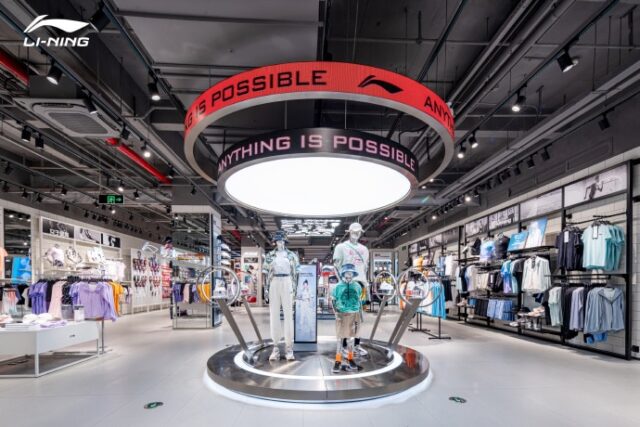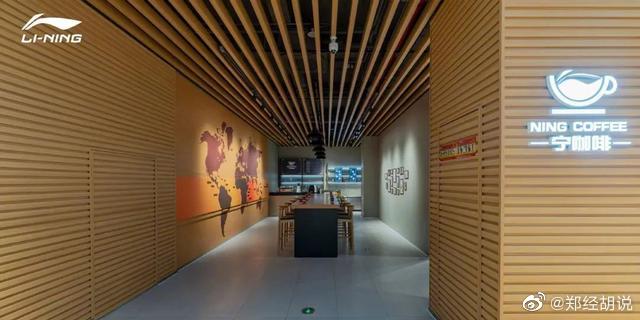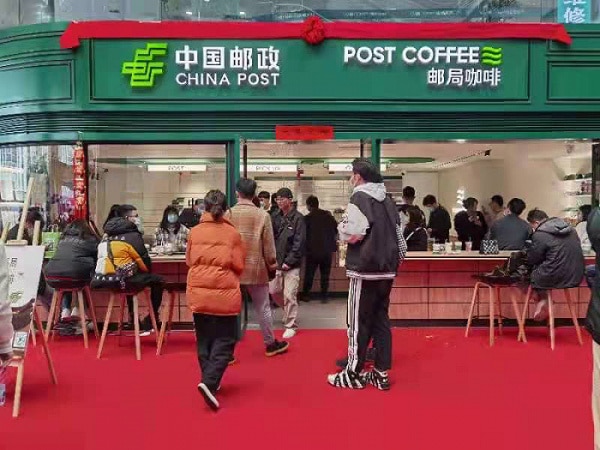Another player is joining mainland China’s growing coffee market. It’s not an American coffee giant, nor a coffee house chain from Hong Kong – it is China’s leading sportswear brand Li-Ning Sports (李宁体育).
Li-Ning registered its coffee brand under the ‘NING COFFEE’ trademark. As reported in an article written by ‘Investment Group’ (@投资界) and published by Toutiao News (@头条新闻), Li-Ning has confirmed on May 6 that it will provide in-store coffee services to enhance customers’ shopping experiences in the near future.
The move means that Li-Ning could potentially become a big player in China’s coffee market, competing with major brands such as Starbucks, Luckin Coffee, Costa and Pacific. If the in-store coffee cafes would roll out in most of its shops, there could be over 7000 Ning Coffee cafes in China in the future. By the end of 2021, Li-Ning Sports had a total of 7,137 stores in China.

Starbucks has 5,400 stores in China. Leading domestic coffee chain Luckin Coffee expanded to over 6000 stores last year. Costa Coffee, although closing some of its China stores in 2021, announced that it aims to have a total of 1,200 stores open in China later this year. Looking at Li-Ning’s presence across China, its in-store coffee cafes could be serious competition for the leading coffee chains in the country.

Over the past few years, various Chinese sportswear brands, including Anta Sports and Erke, have seen a rise in popularity, but Li-Ning is still China’s most famous brand name for athletic apparel and shoes. The company was founded in the early 1990s by Chinese Olympic gymnast and business entrepreneur Li Ning (1963) and was generally seen as a Nike copycat – the original logo was even similar to the Nike swoosh. Although Li-Ning looked like Nike, the brand is more appealing to many Chinese consumers due to the fact that it is cheaper and made in China.
Li-Ning markets itself as being “deeply and uniquely Chinese” (Li Ning official website 2022), which has made it more popular in an era of “proudly made in China” (read more about that here). Moreover, it also promises to offer high-quality sportwear at a price that is cheaper than the American Nike or German Adidas.
Li-Ning’s success is also owed to its marketing strategies. Besides being the official marketing partner of many major sports events, including the NBA in China, the brand has also contracted with many household athletes and famous global ambassadors.
Over a decade ago, marketing observers already noted that despite the remarkable success of Li-Ning in China, the brand still had a long way to go in order to strengthen its image as a long-term brand, recommending Li-Ning to “create excitement around the brand” by building more associations related to lifestyle and coolness to better resonate with younger Chinese customers (Bell 2008, 81; Roll 2006, 170).
With its latest move into the coffee market, it is clear that Li-Ning is moving its brand positioning more toward the direction of lifestyle, trendiness, and luxury. Although purchasing a coffee at Starbucks or Luckin is part of the everyday routine for many urban millennials, coffee is still viewed as a trendy luxury product for many, relating to both cultural factors as well as economic reasons. As noted by Cat Hanson in 2015, the price of a single cup of coffee was equal to a month’s worth of home broadband internet (read more).
Previously, other fashion brands have also opened up coffee stores in China. As reported by Jing Daily, international luxury brands Prada, Louis Vuitton, and FENDI also opened up coffee cafes in mainland China.
Another unexpected coffee cafe is that of China Post, which opened its first in-store ‘Post Coffee’ in Xiamen earlier this year. On social media, many netizens commented that the brand image of the national post service clashed with that of a fairly expensive coffee house (coffee prices starting at 22 yuan / $3,3).
“The postal services are located in cities and in the countryside and are often used by migrant workers, and generally this demographic isn’t buying coffee,” one person commented, with another netizen writing: “This does not suit the taste of ordinary people, it would’ve been better if they sold milk tea.”

Post Coffee, via Jiemian Official.
On Weibo, Li-Ning’s journey into the competitive coffee market was discussed using the hashtags “Li-Ning Enters the Coffee Race” (#李宁入局咖啡赛道#) and “Li-Ning Starts Selling Coffee” (##李宁开始卖咖啡##).
Like with China Post, many commenters say the combination of sportswear and coffee is not something they immediately find logical. “Will they also sell sneaker-flavored coffee?” one person wondered, with others thinking selling coffee – seen as a product from western countries – does not exactly match with Li-Ning as a ‘proudly made-in-China’ brand.
“How would you feel about trying on some clothes at Li-Ning while sipping on Li-Ning coffee? I understand Li-Ning is jumping on what’s popular, and this time it’s coffee,” one Weibo user writes, with others also writing: “I think it has potential.”
“I’m willing to try it out,” various commenters write. For others, they want to see the menu first: “It all depends on the price.”
For more about the coffee and tea market in China, check our other articles here.
By Manya Koetse
Get the story behind the hashtag. Subscribe to What’s on Weibo here to receive our weekly newsletter and get access to our latest articles:
References
Bell, Sandra. 2008. International Brand Management of Chinese Companies. Heidelberg: Physia-Verlag.
Roll, Martin. 2006. Asian Brand Strategy: How Asia Builds Strong Brands. New York: Palgrave Macmillan.
Spotted a mistake or want to add something? Please let us know in comments below or email us. First-time commenters, please be patient – we will have to manually approve your comment before it appears.
©2022 Whatsonweibo. All rights reserved. Do not reproduce our content without permission – you can contact us at info@whatsonweibo.com.
The post Would You Like Coffee with Your Sneakers? Chinese Sports Brand Li-Ning Registers Its ‘Ning Coffee’ Brand appeared first on What's on Weibo.